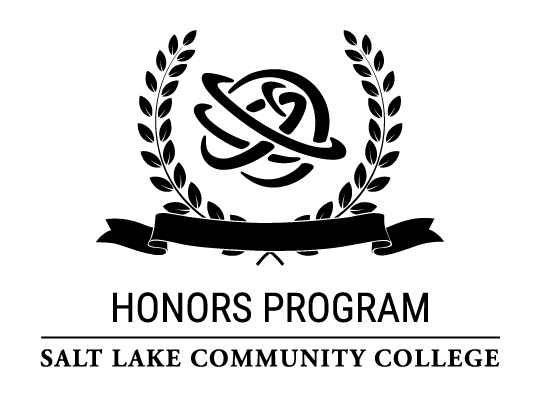
SLCC Honors Program
SLCC's Honors Program is a personalized, engaging, and transformative experience open to all SLCC AS/AA degree-seeking students. Students in the Honors Program will sharpen their academic and scholarly skills through several rigorous Honors Courses that fulfill 9 credits of General Education: Social Sciences (SS), Humanities (HU), and the second half of Composition (EN).
Mission Statement
The Salt Lake Community College Honors Program is a diverse community of engaged students, faculty, and staff dedicated to a transformative education in which we all learn from each other. It is open to students of any major whose educational goals include transfer to a 4-year college or university. The Honors Program community is designed to increase opportunities for underserved students and students with the as-yet-untapped potential to succeed in their education by leveraging high-impact practices (HIPs), reflective ePortfolios, honors courses, small cohorts, and enrichment experiences.
Features
High-Impact Practices
Scholar George Kuh has identified 11 High-Impact Practices (HIPs) ranging from community-based learning to undergraduate research that evidence indicates are highly beneficial for college students. SLCC Honors Program ensures that students experience 3 of these HIPs during their time here.
Enrichment Experiences
Students participate in two Enrichment Experiences of their choice per semester, ranging from Faculty Film Night to attending the Tanner Forum on Social Ethics. These experiences build community, a sense of belonging, and enrich student learning. Students will document and reflect on these experiences in their ePortfolio.
Connections
Class cohorts are small enough for students to get to know one another, and the program fosters connections between students and their faculty. Because the Honors Program has students from a variety of disciplines, students benefit by interacting with colleagues who are pursuing different majors. Advanced honors students peer mentor incoming honors students.
Reflective ePortfolios
All Honors students showcase their learning and reflect on their experiences in their ePortfolio. Strong ePortfolio pedagogy has been recognized as a High Impact Practice. Because they are curated, evidence-rich websites, Honors ePortfolios document academic transformation and help students compete for scholarships and admissions in bachelor’s degree programs.
Honors Courses
Honors courses challenge students with critical reading and reflection exercises, integrative discussions, and assignments that set them up for further academic success in their major. The Honors courses satisfy the Social Science (SS), the Humanities (HU), and the second half of the Composition (EN) General Education requirements.
Success Coaching
The Honors Program has a dedicated program manager, as well as faculty/staff and peer mentors, who help students meet program requirements, schedule and register for classes, understand transfer options, and navigate academic life.